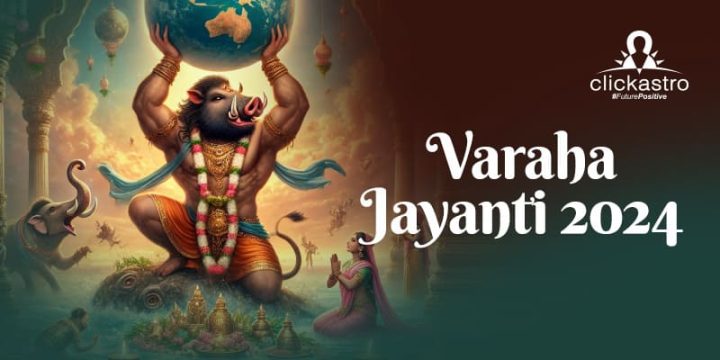Introduction
Varaha Jayanti celebrates the third incarnation of Lord Vishnu in the form of Varaha, the mighty boar. This avatar of Vishnu represents the ultimate triumph of good over evil, and the restoration of cosmic balance. According to ancient history, Lord Vishnu took the Varaha form to rescue the Earth, which had been submerged in the cosmic ocean by the demon Hiranyaksha. The festival is not just a commemoration of this mighty event but a reminder of the importance of righteousness, courage, and divine intervention in the face of adversity.
In 2024, Varaha Jayanti falls on Friday, September 6th, a day that will be marked by various spiritual rituals, prayers, and acts of devotion. This auspicious occasion holds immense significance for devotees, who gather to honor Lord Vishnu’s role in preserving the order of the universe.
Date and Timing
Varaha Jayanti 2024 is celebrated on Tritiya Tithi of
Shukla Paksha in the month of Bhadrapada, as per the
Hindu calendar. The Tritiya tithi, marking the beginning of the festival, starts at 12:20 PM on September 5th and ends at 3:00 PM on September 6th. This precise timing is essential for devotees to perform the rituals and offer prayers to Lord Varaha, seeking his blessings for protection and prosperity.
Read about Janmashtami 2024 – Date, Puja Timings, Significance
The Tale of Varaha Jayanti
The tale of Varaha Jayanti is deeply rooted in ancient Hindu scriptures, particularly the Vishnu Purana and Bhagavata Purana. It narrates the story of two brothers, Vijaya and Jaya, who were the gatekeepers of Lord Vishnu’s celestial abode, Vaikuntha. Known for their unwavering loyalty, they once denied entry to the Sanat Kumaras, the mind-born sons of Lord Brahma. The Kumaras, being sages of great spiritual power, were offended by this arrogance and cursed Vijaya and Jaya to be born on Earth as mortals. Lord Vishnu, recognizing the gravity of the situation, informed them that they would be liberated from the curse and achieve Moksha (liberation) after being slain by him in their incarnations.
In their mortal forms, Vijaya and Jaya were born as the powerful Asura (demon) brothers Hiranyaksha and Hiranyakashipu. Hiranyaksha, the elder of the two, was a formidable being who performed severe penance to please Lord Brahma. As a result, he was granted a boon that made him nearly invincible—he could not be killed by any deity, human, Asura, or animal. However, in his arrogance, Hiranyaksha neglected to mention a boar in his request, leaving a small but crucial loophole.
Empowered by his boon, Hiranyaksha wreaked havoc across the universe, eventually submerging the Earth into the deep cosmic ocean, thereby disrupting the natural balance and causing widespread chaos. The gods, helpless in the face of this calamity, prayed to Lord Vishnu for intervention. In response, Vishnu incarnated as Varaha, a gigantic boar with immense strength and divine powers, to rescue the Earth and restore cosmic order.
What followed was a fierce and epic battle between Varaha and Hiranyaksha, a confrontation that lasted for a thousand years. Despite Hiranyaksha’s immense power, he was ultimately no match for Lord Varaha’s divine might and unyielding commitment to righteousness. Varaha defeated the demon, lifted the Earth on his tusks, and carried it safely back to its rightful place in the universe.
This act of divine intervention not only restored balance to the cosmos but also reaffirmed the fundamental principles of dharma (moral order). The tale of Varaha Jayanti is a profound reminder of the power of good over evil, the importance of humility, and the assurance that the divine will always act to protect and preserve the natural order. For devotees, this story serves as an eternal source of inspiration and faith in the divine justice that governs the universe.
Significance of Varaha Jayanti
Varaha Jayanti is not just a festival but a deeply spiritual occasion that carries immense significance for devotees. Celebrated to honor Lord Vishnu’s incarnation as Varaha, this festival symbolizes the triumph of good over evil and underscores the vital importance of dharma, or moral order, in maintaining the balance of the universe.
Triumph of Good Over Evil:
At the heart of Varaha Jayanti is the celebration of righteousness prevailing over malevolent forces. The story of Lord Varaha’s victory over the demon Hiranyaksha is a powerful reminder that no matter how formidable the forces of darkness may seem, righteousness and divine justice will ultimately prevail.
Courage, Sacrifice, and Righteousness: The narrative of Varaha Jayanti is rich with lessons in courage, sacrifice, and the unwavering commitment to uphold justice. Lord Varaha’s epic battle against Hiranyaksha teaches the importance of standing up against evil and making necessary sacrifices to protect the greater good. These values are celebrated and internalized by devotees, who are inspired to lead lives of integrity and courage.
Spiritual Growth and Transformation:
The rituals and prayers performed during Varaha Jayanti offer devotees an opportunity for spiritual growth and self-reflection. By engaging in these sacred practices, believers are reminded of the divine’s constant presence and intervention in times of crisis. This fosters a sense of inner transformation and deepens their spiritual journey.
Community and Charity: Varaha Jayanti also emphasizes the values of community and charity. Devotees come together to participate in rituals, offer prayers, and engage in acts of kindness and charity. This collective worship fosters a sense of unity and reinforces the importance of supporting one another, particularly those in need.
Blessings of Prosperity and Abundance:
Finally, Varaha Jayanti is seen as an auspicious day for seeking blessings of prosperity and abundance. Devotees believe that performing the rituals with devotion and sincerity can invoke Lord Varaha’s blessings for protection, prosperity, and the removal of obstacles in their lives, ensuring a future of peace and success.
Where is Varaha Jayanti Celebrated?
Varaha Jayanti is celebrated with fervor across various regions of India, particularly in
Mathura, Uttar Pradesh, and at the renowned Tirumala Temple in Andhra Pradesh. Mathura, a city deeply connected to ancient Hindu history, observes this festival with traditional rituals and community gatherings that honor Lord Vishnu’s Varaha incarnation.
The
Tirumala Temple in Tirupati is famous for its grand celebrations of Varaha Jayanti. This temple, which houses a dedicated shrine to Lord Varaha, becomes a focal point of devotion during the festival. Thousands of devotees flock to Tirumala to partake in the special pujas, processions, and other religious ceremonies held in honor of Lord Varaha. The atmosphere is filled with spiritual energy as devotees come together to seek blessings, offer prayers, and celebrate the divine victory of good over evil.
Rituals of Varaha Jayanti
The rituals performed during Varaha Jayanti are deeply rooted in Hindu traditions and are meant to honor Lord Varaha while seeking his divine blessings. These rituals not only reflect devotion but also emphasize the importance of purification, self-discipline, charity, and spiritual growth.
Purification:
The day of Varaha Jayanti begins with a purification process. Devotees wake up early and take a cleansing bath, often using holy water from sacred rivers such as the Ganges. This ritual bathing is believed to purify the body and soul, preparing devotees for the sacred activities of the day. The pooja area or temple within the home is also thoroughly cleansed and purified, symbolizing the removal of negativity and the creation of a sanctified space for worship.
Fasting:
Observing a fast is a significant aspect of Varaha Jayanti. Many devotees abstain from food and water throughout the day, a practice known as Nirjala Upavasa, while others may choose a partial fast, consuming only milk and fruits. Fasting demonstrates devotion, self-control, and a willingness to sacrifice personal comforts for the divine. The fast typically begins at sunrise and concludes with the evening puja, when devotees break their fast with prasad (blessed food) after offering it to the deity.
Kalash Pooja:
A unique and important ritual during Varaha Jayanti is the Kalash Pooja. Devotees place an idol or picture of Lord Varaha inside a metal pot, known as a Kalash, which is filled with water and adorned with mango leaves. A coconut is placed on top of the Kalash, symbolizing the universe and the presence of the divine. After the puja, the Kalash is traditionally donated to a Brahmin or a temple, signifying an offering to the divine and a gesture of humility and gratitude.
Puja Essentials:
The central part of the Varaha Jayanti celebration is the Shodashopachar Puja, a detailed sixteen-step worship process that involves various offerings and rituals. Devotees perform the Abhishek, or ritual bath, of Lord Varaha’s idol using Panchamrit—a mixture of water, milk, yogurt, honey, and ghee. This ritual is a symbolic cleansing and an act of reverence. Following the Abhishek, offerings such as lotus flowers, Chandan (sandalwood), Akshata (rice), kumkum (vermilion), betel leaves, and nuts are made to the deity. Devotees recite the Varaha Sahasranama (thousand names of Lord Varaha) or other Vishnu mantras, creating a spiritually charged atmosphere. The puja concludes with an aarti, a ritual in which devotees wave lighted lamps before the deity while singing hymns, signifying the dispelling of darkness and ignorance.
Charity:
Acts of charity are a fundamental part of Varaha Jayanti. Devotees believe that giving to those in need, whether through food, clothing, or financial donations, not only pleases Lord Varaha but also brings blessings of prosperity and happiness. Charity is seen as a way to express compassion and solidarity with others, and it reflects the festival’s emphasis on community and collective well-being.
Conclusion
Varaha Jayanti 2024 is more than just a festival; it is a profound celebration of faith, devotion, and the eternal struggle between good and evil. This auspicious day reminds devotees of the divine intervention that sustains cosmic order and reinforces the importance of upholding dharma in every aspect of life. By engaging in the rituals and traditions of Varaha Jayanti, devotees express their unwavering devotion to Lord Vishnu, particularly in His Varaha avatar, and seek His blessings for a life marked by righteousness, prosperity, and spiritual growth. The festival serves as a powerful reminder that no matter how daunting the challenges may be, the divine always intervenes to protect the universe and restore balance.


